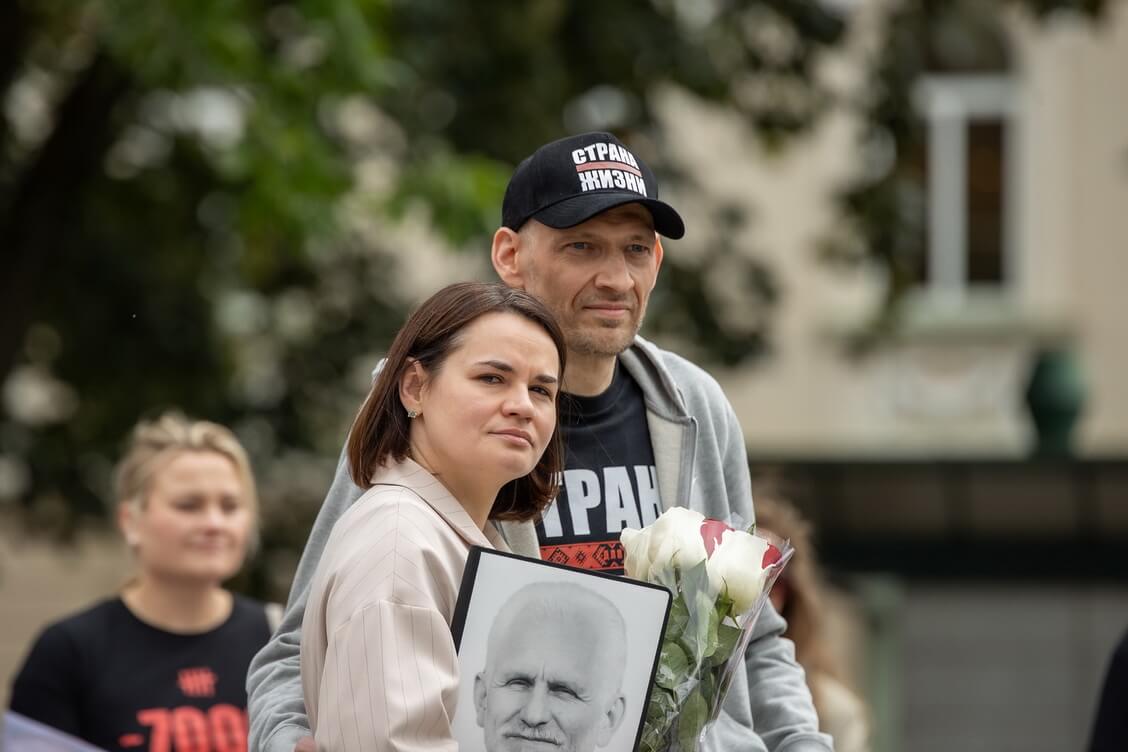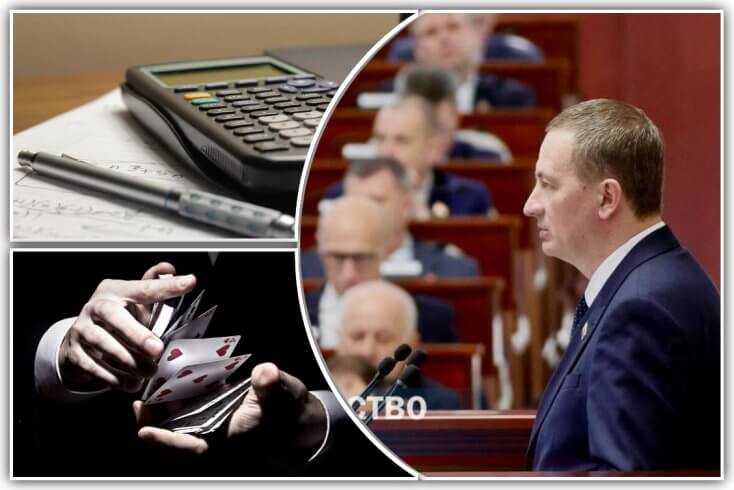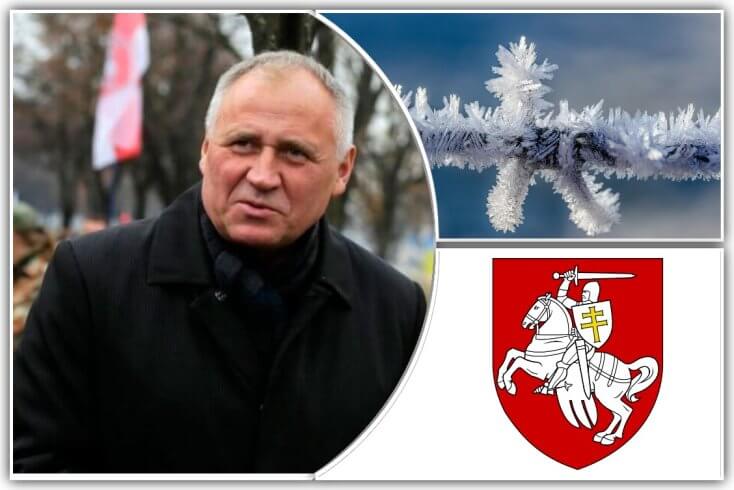Siarhiej Cichanoŭski’s behavior during a September 24 meeting with Belarusians in New York, alongside his wife and opposition leader Śviatłana Cichanoŭskaja, sparked a storm of criticism on social media. His domineering manner struck many as out of place, especially in a society that has suffered for 31 years under the rule of Alaksandar Łukašenka — the embodiment of male chauvinism.

Belarusians fed up with male chauvinism
Łukašenka has long cultivated an image of patronizing respect for women, offering them compliments on International Women’s Day or in other ceremonial settings. Yet in his working meetings he habitually addresses officials as “muzhiki” (men), signaling that, to him, women are secondary and unfit for serious responsibility.
He has often repeated that the Belarusian presidency “is not for a woman.” On September 17, speaking to his ideology officers, he once again stressed that only a “strong man who has smelled gunpowder” could lead the country — despite claiming to “immensely respect women.”
For three decades, under his command, Belarus has endured financial crises, quarrels with neighbors and, in 2022, the use of its territory for Russia’s assault on Ukraine. One cannot help but wonder whether a more pragmatic and less ego-driven leader — perhaps a woman — might have avoided such calamities.
From populist firebrand to disappointed supporters
Cichanoŭski first rose to prominence in 2020 with fiery speeches that reminded some of Łukašenka in 1994 — full of energy, anger and populist flair. He mobilized disillusioned voters and prepared to run for president, but his campaign was cut short by arrest.
Released from prison on June 21 this year, Cichanoŭski immediately declared that he would deliver a “powerful blow to Łukašism” within three weeks, asking Belarusians to donate €200,000. When the money failed to materialize — his plan being vague and reckless — he lashed out at the very people he sought to lead.
This mirrored Łukašenka’s own style: blaming “little people” for buying dollars during currency crashes or for failing to plant potatoes at their dachas. Instead of reconnecting with reality after five years behind bars, most of them in isolation, Cichanoŭski rushed headlong back into politics with the same swagger and impatience as before.
A naïve politician in a harsher era
I recall seeing him in late 2019 or early 2020, filming an opposition gathering in downtown Minsk for his YouTube channel. Though not part of the discussion, he interrupted with his own campaign ideas — some strikingly naïve. For instance, he proposed that every opponent of the regime light a candle in their window: “Then we’ll see how many of us there are, and in the end we’ll win.”
The seasoned opposition figures present — among them Siarhiej Kaliakin — responded with sad, ironic smiles. They had spent decades devising strategies, only to watch a newcomer propose symbolic gestures with boundless self-confidence. Cichanoŭski seemed then, as now, a political neophyte who mistook bravado for strategy.
Nostalgia for 2020
Łukašenka saw in Cichanoŭski a genuine threat in 2020, perhaps because the blogger’s style resembled his own youthful populism. That is why Cichanoŭski was swiftly arrested at the start of his campaign.
Yet in exile today, he appears stuck in that moment. He tries to revive the same rhetoric and methods that worked five years ago, ignoring how much harsher the environment has become. Inside Belarus, repression has crushed public initiative. Abroad, exiles focus on survival, not grand campaigns. Above all, they lack real tools to influence events at home.
Łukašenka clings to Soviet nostalgia; Cichanoŭski clings to the spirit of 2020. Both are trying to turn back the clock.
In just three months of freedom, Cichanoŭski has already generated controversy: alarming Lithuanians with remarks they interpreted as separatist and boasting that he would “grill Łukašenka like a steak.” Such talk begs the question: is he fighting for democracy, or simply for the thrill of confrontation?
Look, she’s just my wife!
Initially, Cichanoŭski promised to report on his achievements after 100 days, then a year. But patience is not his virtue. “I am a man of action, fire, a center in myself,” he proclaimed. “I don’t need to join some party and wait for their meetings. I am the engine, the locomotive — that’s why people followed me.”
That self-image exploded into public view in New York. Despite repeated assurances from Cichanoŭskaja’s team that he was not involved in her political work, he openly ordered her and her staff around. He told her to cancel a scheduled CNN interview, insisting that the meeting with ordinary Belarusians was more important. He dismissed CNN as a poor choice — an apparent jab at her adviser Franak Viačorka, who had arranged it.
Some attendees were further unsettled when he tried to embrace his wife mid-event. At a political gathering, such gestures do not read as tender, but as possessive. The message seemed clear: she may be your leader, but she is my wife.
A gift to the regime?
Over the past five years, Śviatłana Cichanoŭskaja has transformed from homemaker to experienced politician and diplomat. Her husband, by contrast, appears unable to shed the rough edges of a populist agitator. She handled the awkward situation in New York with patience, but her husband’s conduct inevitably cast a shadow on her team’s credibility.
His later explanations suggested little self-awareness, as he tried to deflect blame rather than acknowledge fault. Unless Cichanoŭskaja establishes clear boundaries for her husband’s role, she risks the perception that he controls not only her but also her political movement.
Meanwhile, Łukašenka and KGB chief Ivan Tertel may be watching with satisfaction. If their decision to release Cichanoŭski was meant to inject division, ego and disruption into the opposition camp, early signs suggest their plan is succeeding.




